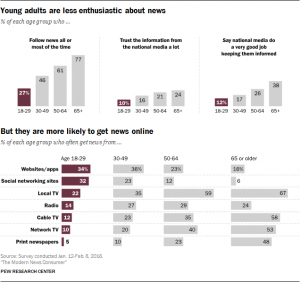The rapid change in how people access and consume news media, especially through the rise of social media, the line between news and entertainment has blurred. With an exponentially increasing amount of choices and growing competition for attention online, the stage has been set to allow satire to dominate the chorus of dissent in the face of modern adversity. The rise of political satire has made the news far more accessible to a hungry audience. “Political humor at least molds a more informed public and at best increases political involvement and excitement.” Now as the Trump administration, which got a boost to victory with the sensational way the media covered his “viral” campaign, has been taking unprecedented action throughout the government and blatantly lying and pushing false narratives, a kind of war with the media has been underway.
Trump considers the media the opposition party. With his administration successfully proving that facts do not make a difference on how people feel and therefore what they believe, it has become easy to turn the news media into the enemy. The media, however, has handled dealing with what Trump says in very inconsistent ways as the role of a journalist changes. The complete lack of trust in the media and the growing perception of bias as ethics change, it is difficult to find the best way to handle someone like Trump, a celebrity personality combining entertainment and governance.
Media outlets originally viewed the outrageous way Trump came onto the political scene as a circus. It was a way to feed the 24-hour news cycle and the entertainment value to the shocking occurrences drove up the views, the most important thing for modern media. The media did not take trump seriously but rolled in the ratings, with Les Moonves (one of the most powerful CEOs in the media) saying, “It may not be good for America, but it is good for CBS.” CBS’s Late Show, with their host Stephen Colbert who earned that job after creating one of the most watched political satires of all time, is the number one voice in late night comedy, because of spending most of his time talking about Trump.
Now, more traditional media outlets have been changing their tone, becoming much harsher towards the action of the administration now that Trump is in office. The media has to take what the President of the United States says seriously, if not the candidate. This has turned them into the opposition party, but it is seen as too little too late by those looking to boldly resist Trump. Late night comedy has become the most successful voice to speak out against Trump. This is due to the power of satire and the way it can “cut through the bullshit” like nothing else.
The power of satire as a critical weapon is seen throughout history and the world. Bassem Youssef, dubbed the John Stewart of Egypt, has run the first Internet-to-TV political satire program in the Middle East. His critique of the authoritarian regime governing his country has led to young people standing up and has been a tool to energize and inspire the protest movement. Youssef recently had to flee Egypt with this family because of the potential retaliation to his dissent. The comparison of him to the American Jon Stewart, the godfather of political satire when he helmed the Daily Show, shows the importance of satire to Democracy as a whole. Being able to exaggerate the absurdity in the world around you, a new kind of perspective becomes clear. Humor is not only a way to make it accessible and relatable, but also a way to reflect reality and draw conclusions from the context and narrative thread of a story. In this post-fact, viral world, satire is one of the ways people can still find the light at the end of the tunnel.
Brian Eckelkamp

